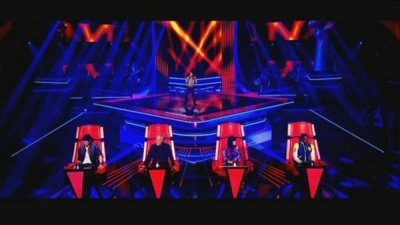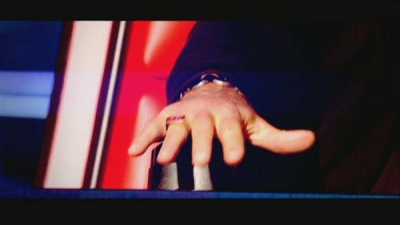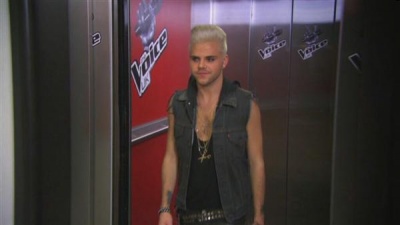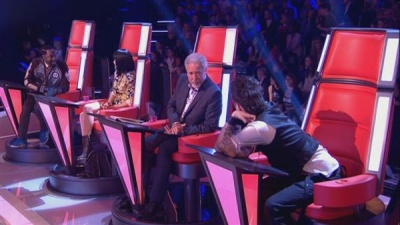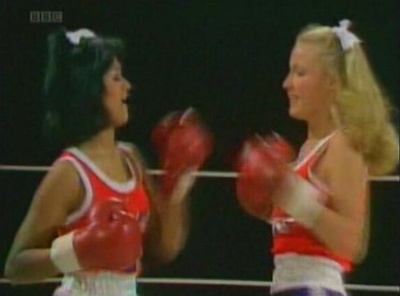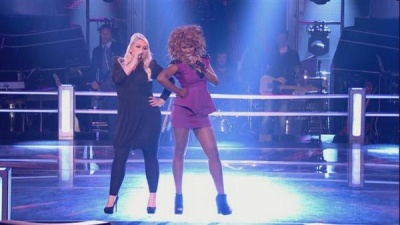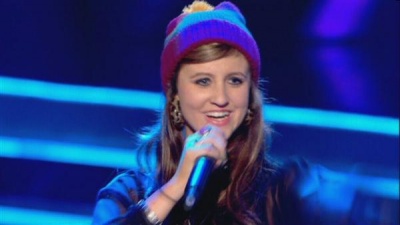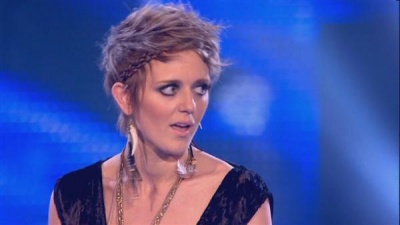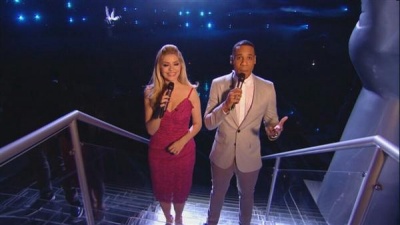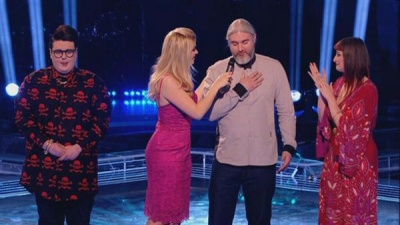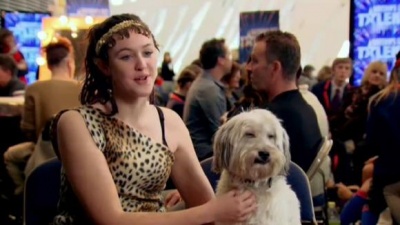Weaver's Week 2012-05-20
Last week | Weaver's Week Index | Next week
The Voice of Holland UK
BBC1 from 24 March
And so we get to our review of The Voice of Holland UK. Now, this column knows good television when we see it, but we don't necessarily know technically good singing when we hear it. On a show that is about technically good singing, that's a pretty big gap. To cover our ignorance, we've invited David Howell to lead the review. David is a shining light on the Southampton karaoke circuit; for clarity, he's writing in indents and quotation marks. We'll chime in with observations and additional points and photo captions.
Mr. Howell, all yours.
- "What do you get if you take the still-winning formula of The X Factor, and get rid of everything that's insufferable about it, from Simon Cowell to the preponderance of vacuous pretty young things who aren't especially good at singing? Something that's different enough from The X Factor for ITV to throw a stackload of money into a bidding war for a Dutch format. Surprisingly, though, they lost it to the BBC, who promptly got sucked into a ratings war they may or may not have wanted with Britain's Got Talent.
- "At its heart, The Voice UK – one wonders if the intention for that title was to encourage microbloggers to use #thevoiceuk rather than #thevoice, given how many on-screen reminders there are – is Yet Another Singing Competition Show. So what makes it different from the show it's nakedly attempting to trump?"
Ooh, interesting. This column understood that The Voice UK got its name because all the international versions follow one naming convention: The Voice of Holland, The Voice of Ireland, The Voice of Germany. But "The Voice of UK" makes absolutely no sense, so the dative preposition was dropped beneath the table. They could have called it "The Voice of The UK", but didn't.
Another thing common to all the international editions is the way there's a publicity shot of all the judges and the hosts making a V sign. V for Victory, V for la Revolution, V for The Voice. The show's set includes a ginormous hand, holding up two fingers and a microphone. It's only ever shot from the palm. Very curious, that.
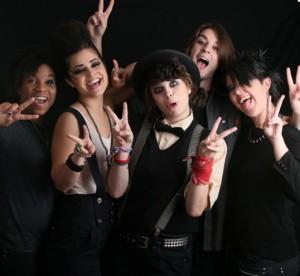 Autumn 2010: Voodoo Hussy (remember them?) make the international sign of The Voice, before the show airs anywhere.
Autumn 2010: Voodoo Hussy (remember them?) make the international sign of The Voice, before the show airs anywhere.
Mr. H, back to you.
- "The vast majority of the differences, and certainly nearly all the good ones, are in the audition process. While the Cowell shows take a worrying amount of gleeful pride in putting some of the least competent performers in front of the judging panel to subject them to shameful verbal bullying – setting an alarming example to young viewers – The Voice UK screens them all out off-screen first, and invites perhaps 100 performers (mostly soloists, with a few duos) to the blind auditions, the first televised round. These are so-called because the judging panel face the studio audience, and cannot see the singers. Upon hearing someone they are suitably enamoured by, they press a button on their chair, and are sent rotating 180 degrees to see the singer.
- "If none of the panel do this, the act is eliminated, usually with apologetic remarks and constructive criticism from the panel, never with an insult. If, however, one of the panel pushes their button, they go through to the next round. And if more than one does so, they are then given a choice of which of them they would like to work with."
This column's complete notes from the first six hours (of which we actively watched about two) were: "Nice. Very nice. Possibly a bit too nice. The captains intimated they knew what they were looking for, but didn't bother sharing this info with us. Excuses for not picking people?"
This is a good time for David to mention the panel.
- "This is a good time to mention the panel – perhaps the best, at least on paper, ever seen on a talent show on UK television. Sir Tom Jones should need no introduction; Jessie J has quickly gained both popular and critical acclaim; will.i.am is part of the enduringly popular rap group The Black Eyed Peas, and has written and produced songs for other artists; finally, Danny O'Donoghue may seem a nobody in this company, but his band The Script are responsible for at least one of the sixty songs played on local radio every day. Everyone has a different background within pop music, so artists given a choice between them have a meaningful decision."
From this column's perspective, it's clear that all of the performers rank the managers – some of them wanted Tom Jones, some directly appealed to will.i.am, and many would put Jessie J into the mix. But most contenders see Danny O'Donoghue as the least desirable alternative. Mr. O'Donoghue is portrayed as indecisive, trying to encourage Mr. Jones or Miss J to push their buzzer so that he doesn't stand out from the crowd. We're not sure whether that's accurate, or fair on him, or a reflection of his usefulness.
One thing is certain: Mr. O'Donoghue wasn't the first choice for the last slot. That was Will Young, the winner of Pop Idle way back in 2002. This appointment was vetoed by the BBC, when they noted that Mr. Young, Mr. Jones, Miss J, and will.i.am are all signed to Universal Records. The winner will also be signed to Universal Records, and critics would have noted that this was a huge conflict of interest, almost as large as Richard Park's sense of entitlement.
Other pop stars appeared on the programme – a former member of boyband Five made it to the audition programme, but no further. Cassius Henry had had a couple of minor hits, and he's made the Top Twenty of this competition, a personal best. The Voice was also responsible for the short-lived Five Star revival, as Deniece Pearson made it through the audition round, before being eliminated. The revival ends here, without ever answering the question.
Davemundo, other than Reggie playing some tunes, how did the Top Forty become the Top Twenty?
- "Each artist picks precisely ten acts to take through to the next round. That's a problem, because by the end good singers get passed up purely because teams are already full, and by the time Will was the last mentor with a spot remaining, he was basically playing Deal or No Deal without being able to see the board.
- "What's more of a problem is the format of that next round. The ten from each team are drawn by their mentor into five pairs, who sing the same song over the top of each other. It's called 'the battle round'. It could more aptly be called 'the painful shouting and melisma round'. Having the shouters doing their thing, whatever that may be at that point, inside an actual boxing ring just adds insult to injury.
- "And speaking of injury, that's precisely what's being risked, both to the singers in question, and to the viewers at home, seeing this and thinking they want to emulate it, who don't have access to the show's vocal coaches. Who, ironically enough, are trained in a teaching philosophy – the Estill Method – that makes a point of being free of aesthetic bias in favour of one style or another. The show they're working on clearly isn't."
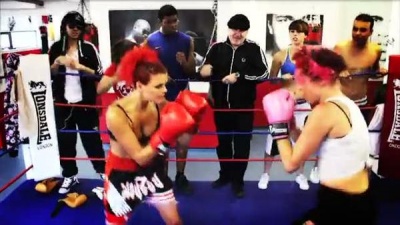 Summer 2011: Red 'n' Pink sing and dance in a boxing ring.
Summer 2011: Red 'n' Pink sing and dance in a boxing ring.
We made some more copious notes about this third round. Starting with the observation that there was never an explanation of why the managers had paired X with Y and not Z. Jessie J, in particular, was rigging the game – she knew who she was taking through, she paired them against weaker contenders and gave songs to suit them.
The round went for noise rather than quality. It was over-singing, over-emoting. It was throwing air at a microphone in the hope that they'd be praised for being louder. Within half an hour, we were noting down, "Boring. Dull. Predictable. Formulaic." Some of the performances were completely unlistenable – and one was so bad it was effectively unbroadcastable.
It's clear there were rounded talents in there, people with stage presence and magnetism, but the format doesn't allow that to appear until the Top Twenty. For example, there are ways to sing "With or without you". There's Bono's way, hollering down the microphone until someone sticks a tax demand into his gob. And there's Bo's way, stripping out the bombast and bluster until all that's left is a love song. It's different, it's unexpected, and when done well it sends shivers down the spine. But we didn't get to hear that without some bloke trying to be the new Bono, just without the restraint.
DH, we're up to the live shows.
- "Having gone from the sublime to the ridiculous, the format settles belatedly on the quotidian with the live shows, which work exactly as you'd expect – act announced, VT clips (which are a bit more about the singing and a bit less about the backstage tantrums than on the Cowell shows, but not by enough), performance, critique (in which the panel alternate between wonderfully insightful and painfully inane seemingly at will), reminder of phone number for the end of the show. Much emphasis is placed on the presence of a live band, and that mobile voting costs only 25p – possibly because these are the biggest differences between this and the ITV competition.
- "Well, that might be slightly unfair, there are some rather good arrangements, and there's no theming for each week, meaning everyone sings something to suit them. All told, there's a real seen this before vibe, and the rapid pace of elimination – two artists eliminated in each of the first two weeks, then four (count 'em!) gone in each of the next three to set up a four-way final – makes it hard to really settle into rooting for a favourite singer, especially with not all of them on every week. There's a reason other talent shows remove one artist per week."
How to annoy the Week: with video introductions. Do we really need to spend three minutes reminding ourselves that Jaz is fertile, or that Ruth has been to Hull and back, or that Tyler was friends with Amy Winehouse (RIP, and also signed to Universal Records). The footage fills the same vapid hole as all the biogs on The X Factor. If we were encouraged to vote on the voice, and not the backstory, it's completely unnecessary. Next week, Eurovision Song Contest will be changing the set in 45 seconds; The Voice doesn't need four times as long, it chooses to take that long.
Dancers and backing singers appear in the live shows. There's a place for this kind of accoutrement, they do make for a far superior show, but perhaps not in the very first live performances. This column would also have liked to see more criticism from the managers. This doesn't need to be constructive – when someone has been completely off key, have the courage and integrity to tell the truth, don't use evasions like "pitchy".
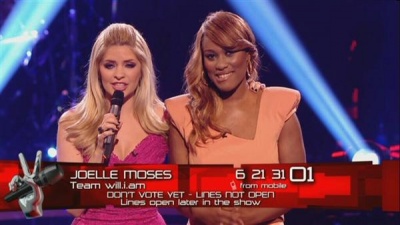 The small print: voting lines open at the end of the show and close at 9pm tonight. Calls cost 25p from a mobile and BT landline; other networks may vary. For each vote, a minimum of 10p will go to the BBC Performing Arts Fund. Don't call now as your vote won't count but you may still be charged. Hughie Green never had to put up with this.
The small print: voting lines open at the end of the show and close at 9pm tonight. Calls cost 25p from a mobile and BT landline; other networks may vary. For each vote, a minimum of 10p will go to the BBC Performing Arts Fund. Don't call now as your vote won't count but you may still be charged. Hughie Green never had to put up with this.
History may recall The Voice was the first show to use uniform cost codes, ensuring that viewers with mobile phones would pay the same as viewers on a landline, no matter what company provided the service.
We'll recall The Voice for making it really difficult to work out who we should be voting for. The voting strap was complex – as well as two numbers (one for landline, one for mobile), there was the contender's name, the manager's name, the show's logo, and the warning not to vote until Holly declared the lines open.
For the sake of argument, if we were rooting for a particular contender in will.i.am's group, then obviously we'd want to vote there, early and often. But if we had two favourites, would our votes offset and become of less value? Yes, but only if they're in the same group; if our second favourite was in Tom Jones' group, we could vote for them in good faith. Or we could vote for the weakest contender in Tom's section, hoping to keep them in and make our fave's job easier. Tactical voting was possible, heaps of viewer confusion almost inevitable. At one point our swingometer suggested we should cheer for Hijack Oscar to beat Eimear Quinn, thus gifting Shepherd's Hedge to Gordon the Gopher on a split-decision supplementary topup.
The choice of repertoire is crucial, it can make the difference between success and failure. And we know that some contenders are really good songwriters – her Myspace page shows Frances Wood is capable of writing "Girl like me", which effortlessly captures the rush of emotions and hormones from seeing someone cute, and perfectly showcases her vocal style. But would the viewing millions get to see that? No. Not when we can be fed familiar but tepid works made famous by Chaka Khan and Robin S. Note carefully, two songs originally recorded before Frances was born.
Or take Bo Bruce. She appeared on Channel 4's Unsigned Act a few years ago, seizing the chance to perform some of her own works. Thanks to that judging panel's consistently and spectacularly poor judgement, Bo remained unsigned, and free to perform her works on this programme. Except we're still waiting for Bo's own work, and we're not holding our breath.
While we're discussing the merits of contenders, here's Davidhowell's notes.
- "Jaz and Ruth do seem to be getting a lot of the attention. It's not clear whether that's because they're actually the best singers in the competition (they arguably aren't), because they're the most flamboyant vocal show ponies in the competition (they probably are), or because they deviate dramatically from the visual archetype of the factory pop singer and hence epitomise the show's inferred attack on the Cowell shows (they certainly do).
- "Reggie Yates and Holly Willoughby are broadly speaking competent hosts, and they handle the live nature of the show very well, although Holly's strained shouting is almost painful to listen to at times – she sounds like she needs the vocal coaches more than the performers themselves do. It is perhaps surprising that Holly is usually found on the stage in the live shows, while Reggie is backstage in a room with the performers and a big screen showing microblogger chirpings.
- "Other production decisions made are rather better, and again the auditions are the highlight – seeing the cuts to the artist's family watching their audition on a screen backstage somehow works brilliantly, and the cuts to the panel members trying to encourage each other to press their buttons is oddly compelling. Those auditions felt like something new and exciting in a way the live shows really did not."
Even at this untutored angle, this column could tell the results show went out on Sunday nights, having been pre-recorded on Saturday. It spent a huge length of time telling us the result of the phone vote, with the same synthetic, manufactured, obviously fake tension. There's not even a sing-off, like they have on X Factor, just a decision by the manager. Give it up, it's completely unconvincing. For all the performances by the other people, the entire programme has only slightly less tension than the skin of a balloon that went "pffffffft" last night and is now a crumpled and slightly soggy mess behind the sofa.
Two other things struck us from the first results show. Star guest Lana Del Ray was poor, managing to be out-sung by just about all of the actual contenders. And host Holly Willoughby committed the cardinal sin of friendly game show hosting: never turn your back on a loser.
Is all this repairable? Mr. Howell reckons it is.
- "The fix for this, the battle round, and the pick exactly ten artists problem in the audition round is very simple: each of the panel can pick as many singers as they want within reasonable confines, say a maximum of twelve and a minimum of eight. Then each team gets their own night to perform, spread over two weekends, with the top three in a phone vote – or the top two and a mentor's pick from the next two or three – progressing to the round-of-12, from which weekly shows would then start.
- "In fairness, the show works similarly all over the world, but seeing as the ratings follow the same pattern all over the world – spectacularly good in the audition phases, falling to merely decent for the live shows – you'd think Talpa might be open to allowing the format to be tweaked by the broadcasters in different countries. It's worked for other de Mol shows like Deal or No Deal and Big Brother, after all, and even Who Wants to be a Millionaire has seen some significant revisions in various countries recently."
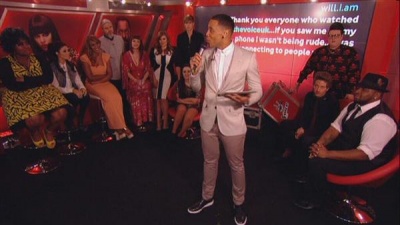 will.i.am got in trouble after blogging during a live show. He wanted pizzas for the audience, and asked Reggie to Get 100.
will.i.am got in trouble after blogging during a live show. He wanted pizzas for the audience, and asked Reggie to Get 100.
The Week would be even more ruthless: in the audition round, managers build up teams as large as they like, but there are only eight places available in their semi-final, and any excess will have to be trimmed in a preview programme. A mixture of public voting and a manager's save ensures three progress to the group finals, from where one contender represents that manager in the overall final. Contenders are encouraged, but not obliged, to use familiar songs.
Returning to reality, and some notes on the future. Next Saturday is the Eurovision Song Contest grand final. There will be almost five hours of people singing for the votes of the Grate British Public, with only the lottery draws providing some non-singing relief. This may be a bit samey, and there's a risk the public will get completely confused, and Tom's representative in the final will be Englebert Humperdinck.
The grand final is scheduled for the Jubilee weekend: will the winner make their first public appearance at the Buckingham Palace concert on Monday night? We know that the winner – and all of the Top Eight – are going on tour during September, with tickets available to see them perform at an arena near you. Before then, all the contenders are doing the inevitable tour of nightclubs, popping up on stage, singing a song, signing some autographs. Is that all there is?
The final word goes to our guest reviewer David Howell.
- "Overall, The Voice is mildly frustrating – it threatens to be at least as good as it was hyped to be, then falls into exactly the same traps and tropes it proudly declares it avoids. As an example of the talent competition game show sub-genre, it's a few tweaks away from being really rather special; as a display of young vocal talent, it's probably already there. The new X-Factor? It's more like the new Fame Academy."
This Week And Next
We regret to report the death of Sophia Brown. The personal banker appeared on Big Brother in 2009, where she lasted barely a week. She suffered from lupus, and was aged thirty years.
If we're to believe "The Talent Show Story", Simon Cowell created Britain's Got Talent because he wanted to see a performing dog on his television screens. It's a slightly unorthodox wish, but not unreasonable, and Mr. Cowell is the sort of person who can turn his dreams into programmes.
Last week, the sixth series of Britain's Got Talent was won by Ashleigh Butler and her performing dog Pudsey. They win half-a-million quid and star billing on the Britain's Got Talent Live Tour, coming to a theatre near you later in the year. (Except it's not.) So, now that Simon Cowell's dearest wish has been granted, will the programme be consigned to history?
Fractionally smaller prizes for the winner of BBC Young Musician of the Year 2012. Laura van der Heijden was awarded a prize 249/250ths smaller, and we trust she'll spend all £2000 wisely. The Eurovision Young Musicians contest also took place last weekend, won by Eivind Holtsmark Ringstad of Norway. Viewers who are wondering why we're giving the result before the BBC4 billing can rest easy: such is its commitment to quality classical music that the BBC isn't taking part this year.
Ratings in the week to 6 May show that there really wasn't much in it. Britain's Got Talent received the highest consolidated audience, 9.55m saw Saturday's show live or within a week, but The Voice was at 9.35m. The results were pulled down to 7.25m, barely beating Alan Sugar on 7.15m. HIGNFY scored 5.65m, In It to Win It 4.45m, Millionaire 3.5m, and The Cube just 3.15m. QI led on BBC2, just beating out Alan Sugar You're Fired at 2.65m. Come Dine With Me had 1.65m, and Maestro at the Opera pulled 1.15m viewers.
2.4m for Celebrity Juice on ITV2, with 1.2m for Britain's Got More Talent and 650,000 for the narrative repeat. A good week for QI on Dave, 400,000 saw Sunday's show. Trade Your Way to the USA finished on 380,000, Gory Games pulled in 340,000 fans, and The Chase on ITV+1 had 295,000. A good week for small shows – Hi TV's Ultimate Search moved up to 13,000 viewers, and ESPN America's Around the Horn had a year-best 7000 viewers on Tuesday night. Next stop: the world!
For the UK brother show Fighting Talk, it's next stop Stoke-on-Trent, from where a live show comes next Saturday. Before then, it's Eurovision Song Contest week, with the semi-finals on Tuesday and Thursday (8pm, BBC3 and RTE2; Tue also RTE Radio 1) and a whole host of supporting programming (A Little Bit Eurovision, 50 Years of Eurovision, From Abba to Azerbaijan, Eurovision's Dirty Secret). There is life beyond Baku – Penn and Teller Tell a Lie (Quest, 9pm Wed) features six truths and a little bitty fib. And Have I Got News for You (BBC1, 9pm Fri) brings together William Shatner and Charlie Brooker in one massive geek explosion.
Links marked with a * help support the UKGameshows servers.
To have Weaver's Week emailed to you on publication day, receive our exclusive TV roundup of the game shows in the week ahead, and chat to other ukgameshows.com readers, sign up to our Yahoo! Group.

